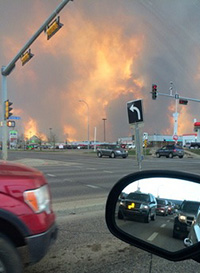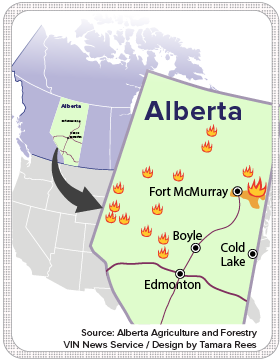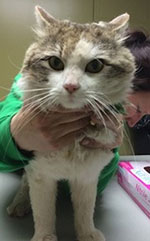
Photo by Dr. Leslie Powell
The horizon appeared ablaze as Dr. Leslie Powell headed back to her clinic in Fort McMurray after lunch on May 3. Later that day, the entire town was evacuated.
A veterinary clinic in a village ordinarily inhabited by 900 people is ordering three times its normal inventory of medications and supplies to serve refugees from the massive ongoing wildfire in Alberta, Canada.
Boyle Veterinary Services is one of several clinics to which evacuated pet owners are arriving in droves to obtain medication for their pets or be seen for the appointments they had had at one of the four clinics in Fort McMurray, 289 kilometers (180 miles) north.
The wildfire drove some 88,000 people from Fort McMurray and neighboring communities on May 3 and 4. Nearly three weeks since it began, the massive inferno was zero-percent contained as of this morning, according to a provincial government update.
The fire has torched more than 2,204 kilometers (1,370 square miles) and is likely to reach neighboring Saskatchewan, CNN reported Wednesday. The blaze is the largest of more than a dozen wildfires burning in Alberta; entire neighborhoods have been burned to the ground.
"We've been here 40 years and we've never seen anything like this," reported Liz Ostrander, whose husband Dr. Robert Ostrander is a solo practitioner at Boyle Veterinary. "There's a huge influx of people coming in with pets. ... Some people are camping in tents in fields. Animals are experiencing a lot of stress. Now there are 3,000 people staying in our area with friends, in campers, in fields. There are lots of dog fights and porcupine quills."
Affected veterinary practices in Fort McMurray are Aurora Veterinary Clinic, Fort McMurray Animal Hospital, Wood Buffalo Small Animal Hospital and Fort McMurray Society for Prevention of Cruelty to Animals (SPCA). None of their facilities was destroyed, according to Dr. Phil Buote, deputy registrar of the Alberta Veterinary Medical Association (ABVMA), and the SPCA subsequently reopened to care for pets left behind and facilitate reunions of pets with their families.
Alberta Premier Rachel Notley has outlined a multi-phase plan for residents to return to Fort McMurray areas starting June 1, provided conditions do not worsen.
When the mandatory evacuation order came on May 3, Dr. Leslie Powell already had taken in three evacuated cats and was beginning a voluntary evacuation of her solo practice at Aurora Veterinary Clinic. Amid the tense situation, she was deeply impressed by the poise of her staff members.
"The calm, organized and steady staff members was what floored me," Powell said. "They called clients, made sure everything was done in the clinic, extracted animals, made sure no clients came in, knowing they had to finish before picking up their own kids. They made sure we had supplies for every animal extracted. Outside, it was bumper-to-bumper traffic, total chaos with helicopters and sirens, but inside, it was so smooth."
Bylaw Services, which manages the local animal control, retrieved the three evacuated cats, along with a cat the clinic had recently adopted. The clinic staff also prepared the clinic’s two dogs and resident lovebird for travel.

With the dogs and bird in tow, Powell discovered that her parked car was blocked in the strip-mall lot by drivers cutting through to avoid the congested nearest intersection. Thinking quickly, Powell began calling friends for help in picking up her four young children, ages 3 to 9, from day care and school. Friends heeded the call, but traffic was difficult. It took her best friend 1½ hours to pick up the two youngest at day care.
Eventually, Powell, children and friend managed to meet at Powell's house. Powell grabbed her cat. In two cars, they convoyed north, the direction evacuees in her part of town were directed. Meanwhile, authorities would not permit Powell’s husband, who’d been working that day on the south side of town, to cross Fort McMurray to join his family. He headed south to the couple’s summer home in Cold Lake.
The first night, it took some five hours for Powell's group to travel 33 kilometers (21 miles). They stopped in Fort McKay, sleeping on the floor of an office building with two other families. The next day, the group took the risk of backtracking to Fort McMurray, where visibility was down to 9 meters (30 feet) from smoke, in hopes of reaching Cold Lake in the south.
There followed a tumultuous 434-kilometer (270-mile) journey. South of Fort McMurray, the only highway out of town was chaotic with bumper-to-bumper traffic at times moving at 130 kph (80 mph). Other times, travel came to a standstill for hours due to congestion. Some vehicles limped to the side of the road, broken down or out of gas. With no available public restrooms, people relieved themselves on the roadside. Good Samaritans from towns to the south such as Wandering River and Plamondon came by with gas, offered water and fruit, even pet food.
Powell’s group eventually reached Cold Lake, where they remain with two other families. Altogether, the sparsely furnished 1,500 square-foot home is housing 11 people, three dogs, one cat, one lovebird and one frog.
Not all families with pets were as fortunate to stay together. Many evacuees had to leave directly from their workplaces and could not retrieve their pets. Volunteers have stepped up to help. In one case related by ABVMA’s Buote, a dog that was dropped off at a veterinary practice for elective surgery earlier in the day was evacuated with an employee of the practice.

Photo by Dr. Leslie Powell
Rescued cats came in recently at a rate of 40 per day to a temporary impound in Fort McMurray.
In other cases, rescue organizations retrieved pets with permission from their respective owners. Powell said peace officers went to the owners' homes in Fort McMurray accompanied by animal handlers from volunteer groups and a locksmith. Animals were taken to the makeshift impound center at the Fort McMurray SPCA, where they were examined by veterinarians, set up with food and water, then transported by bus to Edmonton.
Regionally, several animal rescue centers were established to treat victims of the fire and reunite pets with their owners. Buote helped arrange staffing. In Edmonton, about 150 veterinarians and veterinary technologists collectively put in more than 1,000 hours volunteering at a SPCA evacuation center, he said.
After settling her family in Cold Lake, Powell returned to Fort McMurray for a week to help with pet rescue. Although the mandatory evacuation prohibits the public from entering town, veterinary help is an exception. Powell was not allowed to travel on her own in town; peace officers transported her between the impound center and a hotel.
She found the area around the impound center grim, describing it as a "smoldering, devastated, leveled part of town." She said: "Sometimes, you would see one house gone but everything around it is fine. You'd see smoldering trees and grass that burned; it's hard to describe. I wore a respirator my last days there."
During Powell’s stint, most of the dogs had been picked up, but cats continued coming in at a rate of 40 a day. She also saw a fair number of reptiles, including snakes, bearded dragons and geckos; small mammals such as hedgehogs, hamsters and guinea pigs; and birds.
She found the animals in relatively good shape, although many were dehydrated. "Someone took a video of a hamster drinking water for five straight minutes," Powell said.
She provided basic care, such as administering subcutaneous and intravenous fluids, treating a cat-bite abscess, removing an ingrown nail and so on. She also helped set up protocols for reuniting owners and their pets and keeping records of the condition and care of each animal at the center.
More than 1,000 animals have passed through the impound, by Powell's estimate. Because the public is not allowed in town, transportation must be arranged for pickup of pets by their owners, she said.
The safety of Fort McMurray remains in flux as the wildfire continues. On Monday, veterinary volunteers were evacuated again, and the animals were moved to Edmonton. But the work’s not over. Powell said today she plans to return Friday for another week.
An Alberta SPCA Facebook post reported Wednesday morning that the Fort McMurray People and Animal Reunion Centre in Edmonton had seen 1,160 animals since May 8, of which 725 had been reunited with owners. Another 169 were scheduled to be picked up. They had 230 animals with no owner contact.
To help
Donations may be made to Fort McMurray SPCA or Alberta SPCA.